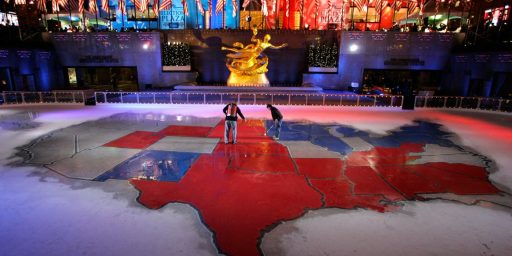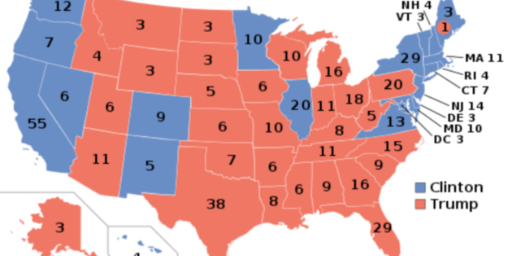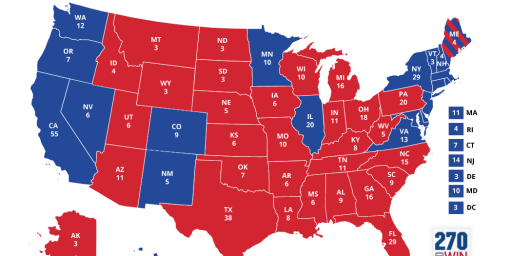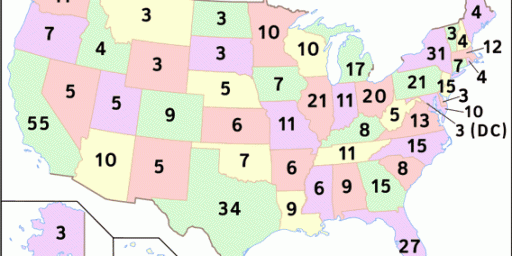Massachussets Approves Electoral College Bypass
Massachusetts will become the latest state to join the National Popular Vote movement, a compact wherein states throw their Electoral College votes to the nationwide winner once enough states agree to ensure that outcome.
Pending the governor’s signature, Massachusetts will become the latest state to join the National Popular Vote movement, a compact wherein states throw their Electoral College votes to the nationwide winner once enough states agree to ensure that outcome.
BoGlo‘s Martin Finucane:
The Massachusetts Legislature has approved a new law intended to bypass the Electoral College system and ensure that the winner of the presidential election is determined by the national popular vote.
“What we are submitting is the idea that the president should be selected by the majority of people in the United States of America,” Senator James B. Eldridge, an Acton Democrat, said before the Senate voted to enact the bill. Under the new bill, he said, “Every vote will be of the same weight across the country.”
But Senate minority leader Richard Tisei said the state was meddling with a system that was “tried and true” since the founding of the country. “We’ve had a lot of bad ideas come through this chamber over the years, but this is going to be one of the worst ideas that has surfaced and actually garnered some support,” said Tisei, who is also the Republican candidate for lieutenant governor.
The bill, which passed on a 28-to-9 vote, now heads to Democratic Governor Deval Patrick’s desk. The governor has said in the past that he supports the bill, said his spokeswoman Kim Haberlin.
Under the law, which was enacted by the House last week, all 12 of the state’s electoral votes would be awarded to the candidate who receives the most votes nationally.
Supporters are campaigning, state by state, to get such bills enacted. Once states accounting for a majority of the electoral votes (or 270 of 538) have enacted the laws, the candidate winning the most votes nationally would be assured a majority of Electoral College votes. That would hold true no matter how the other states vote and how their electoral votes are distributed.
Illinois, New Jersey, Hawaii, Maryland, and Washington have already approved the legislation, according to the National Popular Vote campaign’s website. The new system would only go into effect once a sufficient number of states have passed laws that would make it work.
As AllahPundit notes, it’s highly unlikely enough states will pass a like bill to make it matter.
New York, which has 31 EVs, is on the brink of passing it and California, with 55 EVs, has twice pushed it through the legislature only to have it die on Schwarznegger’s desk. Assume those two states finally get the job done and suddenly we’re at 147 combined electoral votes pledged to the winner of the popular vote — more than halfway to the goal.
[…]
Why would Florida or Ohio, say, forfeit their electoral votes by signing on when their swing-state status ensures plenty of extra attention from the candidates every four years? The more blue states sign up for this, the cooler red states and purple states will be to it, to the point where I wonder how big realistically this bloc can get. 200 EVs, maybe, until other states start walking away? Three cheers for self-interest!
I agree. This is easier than abolishing the Electoral College altogether through the amendment process but the politics are similar. Swing states and small states are highly unlikely to vote away their self-interest. (Remember: The Electoral College mirrors our bicameral legislature, with each state getting as many votes as it has Senators and Representatives. Since all states get two Senators, the small states get a decided advantage that would be erased with a national popular vote.)
Still, the hand-wringing some conservative blogs is over the top.
NRO’s Daniel Foster calls the measure “A Scheme So Nefarious, It Could Only Come from Massachusetts,” “as evil as it is ingenious,” and “end-around on the electoral college and the Constitution.”
If a number of states equivalent to at least 270 electoral votes were to pass the measure, it would effectively neuter the college.
I know that this is remedial for Cornerites, but the electoral college is one of the last vestiges of federalism we have left. It reflects the Founders’ conviction that the method of choosing the Executive should reflect the will of the several states qua states — he’s called the President of the United States, not the President of America. The desire to protect the integrity and discreteness of the states, and to prevent the most populous states from running up the score in the vote, was the essence of the Connecticut Compromise. Do away with the college and you might as well abolish the Senate. Not that many on the Left would shed too many tears over that prospect.
The Other McCain‘s Smitty titles his post “Massachusetts, Purveyor Of Fine Bollocks” and quotes Tisei “The thing about this that bothers me the most is it’s so sneaky. This is the way that liberals do things a lot of times, very sneaky.” To which Smitty adds:
One hopes the American people grasp that this is one more step down the path of collapse into tyranny. Possibly not a big one, but a step nonetheless, and unlikely to gain much traction in Virginia.
Well . . . I don’t know about that. A president elected by the country as a whole isn’t any more likely to be a tyrant than one elected in piecemeal manner. And, frankly, while I support local matters being controlled at the local level and keeping most matters local, it’s unclear to me why, at this point in our history, it makes sense to run national politics as if we were a confederation of provinces.
I do agree, however, as I wrote back in April 2006, that this amounts to “Abolishing the Electoral College by Stealth.”
Technically, there is nothing extra-constitutional about NPV. The Constitution gives state legislatures absolute authority to allocate their Electors as they wish. Indeed, in the earliest days, they simply appointed Electors with instructions to vote for a specific presidential and vice presidential candidate. It was decades before the westward expansion created a groundswell for elections.
What evolved was really a bastardization of the Electoral College. Rather than the state legislators appointing delegates, they simply rubber stamped the election results and handed the power over to a slate of delegates chosen by the winning political party. And Electors are free to vote for whomever they chose. As recently as the 2000 election, a faithless District of Columbia Elector denied her vote to Al Gore out of pique, rubbing additional salt into his wounds. Further, two states, Maine and Nebraska, have a hybrid system wherein two Electors (matching the Senate delegation) are awarded to the at-large winner in the state and the others are awarded to the winner in each of the congressional districts.
So, the NPV system is perfectly constitutional. Essentially, state legislators agree to award their Electors to the national popular vote winner once enough states have made the same agreement to provide 270 Electoral Votes. Until then, their current allocation method-or a substitute one of their own chosing-would remain in effect. There is simply no question that they have the right to do this.
The one caveat, as Robert Prather noted in the comments, is the Article I, Section 10 declaration that “No State shall, without the Consent of Congress . . . enter into any Agreement or Compact with another State.” There really hasn’t been much adjudication on this issue, so it’s possible that it would fall on that ground. But my guess is not, since this is a “compact” only in the loosest sense — each state is acting individually, with a triggering mechanism based on what other states do at some future time.
Additionally, the thread that seems to be running through the blog commentary — that this is some sort of liberal conspiracy to steal the presidency — is dubious, as I pointed out four years ago:
It is not at all clear that shifting plans advantages one party or the other. For one thing, it takes an incredible confluence of events for a candidate to win the necessary 270 Electoral Votes and not also be the plurality winner in the national popular vote. Indeed, George W. Bush in 2000 is the only man to do so in the modern era. We came reasonably close a few other times, as shifts of a few thousand votes in a handful of states could have reversed the outcome in 1960, 1976, and 2004.
Sure, the proposed system would have handed Al Gore the presidency in 2000 but many of us thought that the opposite outcome, Bush winning the popular vote but Gore winning the Electoral vote, was quite possible. After all, the Democratic candidate currently is virtually assured of all of California’s massive Electoral slate. On the other hand, the current system would have given Kerry the win had he won another few thousand votes in Ohio, even though Bush’s national margin of victory was quite comfortable.
Changing demographics will also alter the game in ways there are not entirely clear. The massive influx of Hispanics changed California from a solid Republican to a solid Democrat state. Florida is becoming bluer by the day owing to both an increasing non-Cuban Hispanic population and the migration of retirees from Blue States. And even the Deep South, especially the Carolinas and Georgia, are unlikely to remain safe Republican for long. Then again, other factors could make states that are now safely Blue turn Red.
That much has come to pass, although we’ll see how permanent the changes are. But simply divvying up California’s massive trove of votes rather than starting with the Democrats 1/4 of the way to the presidency before the race even starts would seem to be a boon to the GOP.







This is much ado about nothing since it’s highly unlikely they’ll ever to the vote threshold. You have to laugh at some of the purple prose though. I particularly liked “A Scheme So Nefarious, It Could Only Come from Massachusetts,” “as evil as it is ingenious,”
Mass, the fount of all evil.
James, I believe there has been SCOTUS precedent on the on the compact clause. As I recall, the SCOTUS has limited the requirement of federal approval to only those compacts having a national impact. So, if two bordering states want to agree on road sign issues for things like welcome centers, such a compact does not require Congressional approval. I think the question is whether the compact would effect national power or the power of non-compact states, which I think the answer in either case must be affirmative.
I can’t remember where I read it but as one blogger stated, this will last until Sarah Palin is a head in the national polls in late October. Then, as they did with the Kennedy replacement, the legislatures will rush to try to “fix” things in their party’s favor.
Now the way to undermine this is to get the conversation in 2010, assuming the plan hasn’t been executed, talking about how the votes in New Jersey, Maryland, Illinois wouldn’t matter until we see how the western states vote or that there is no reason to vote in Hawaii because all their votes will go to the candidate leading after the polls close on the West Coast or perhaps even, …middle America. Fire up that conversation at election time and you just might be able to redefine some state legislatures.
JKB — The good news is that when Palin is ahead in the national polls, we’ll all be riding on magic flying ponies and snatching the million dollar bills that are falling from the sky.
Well here are two articles on the issue with their conclusions:
“The compact would effectively supersede the Electoral College and implement popular election of the president without amending the Constitution. Political supporters of the Agreement have been curiously reticent to discuss the validity of the Agreement under Article I, section 10. Although some similar proposals would be invalid under section 10, the Agreement adopted in Maryland does not abuse the structure of the Electoral College, nor does it disrupt the balance of power among the states or between the states and the national government. The Agreement is therefore permissible and probably does not even require congressional consent. ”
http://papers.ssrn.com/sol3/papers.cfm?abstract_id=1030385
“The Compact is actually a compact under the Compact Clause of the Constitution, because the Court has broadly construed what makes a compact. In particular, because the Compact is not effective until a critical mass of States have enacted it, and because States are constrained from withdrawing from the Compact too close to a presidential election, the Compact falls under constitutional scrutiny. Additionally, the Compact addresses a political matter that affects the interests of non-compacting sister States, and the compacting States enhance their political power at the expense of other States. The Article examines the various defenses of the Compact but finds that none of them overcome the political interests of sister States. Therefore, barring congressional consent, the Interstate Compact would fail.”
http://papers.ssrn.com/sol3/papers.cfm?abstract_id=979537
Pick and choose wisely.
The thing is, the states have the right to determine the method of allocating electoral votes, compact or no.